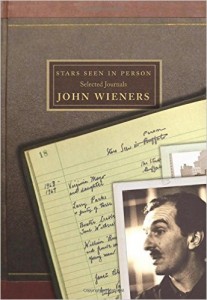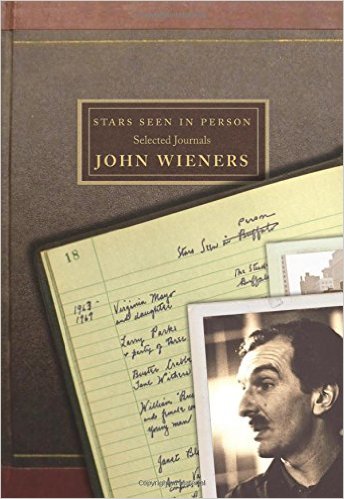 Stars Seen in Person: Selected Journals of John Wieners
Stars Seen in Person: Selected Journals of John Wieners
Edited by Michael Seth Stewart
City Lights Books. 219 pages, $16.95
I MET JOHN WIENERS once in Boston. It was in the late 1990s, after a reading I’d done at the Glad Day Bookshop on Boylston Street. The manager, John Mitzel, and writer Charlie Shively, both of whom I’d known for some time, closed the shop and we walked to the foyer, where a tall man with an aristocratic nose was penciling in a notebook, waiting. Then all four of us wended our way to Chinatown for dinner. It had been a large, excited audience, and Mitzel and Shively were in high spirits and talkative. Wieners said almost nothing, but I noticed how much they deferred to him in small ways. Just as we were splitting up, Wieners said, “I remember you from the early 1970’s. Beacon Hill. You used to go to Sporters. I’d see you coming from your friend’s flat.” I said I used to visit her, but not often, as I was working at a bookstore to make my living then. Wieners replied: “You wore button denims and the tight black T-shirts under your leather jacket that rode above your navel, exposing a few brilliant inches of skin. So I knew you had to be from somewhere else.”
That exact description of how I dressed in my late twenties could sum up Wieners as a poet and as a man. The precision of observed detail, the unforced generalization, the cosmopolitanism, and the ability to see a few inches of bare skin as metaphor, symbol, or definition—these are Wieners’ trademark skills. Reading Stars Seen in Person: Selected Journals, with over 200 pages of prose and poetry, confirmed that assessment.
Was John Wieners a Beat poet? This collection is published by City Lights. His work is found in anthologies of those ’50s stalwarts, and he’s seen in photos with San Francisco poets and landmarks. Was he a New York poet? He lived in Manhattan over the years. Was he a New England poet, a real Bostonian? A gay poet? A confessional poet? An imagist poet? Yes to all of these descriptors. What’s becoming clear from this collection of his journals from the 1950s and ’60s, with many poems from those years and later, is that John Wieners was an important American writer of the 20th century, a voice of his time, a gay man open to relationships, a seeker, and above all someone who needs to be read a great deal more often.
He made his mark early on, in 1958, with The Hotel Wentley Poems, which can stand with the best of Charles Olson and Allen Ginsberg, his peers. But reading his Selected Poems, 1958-1984, it’s clear that he went beyond the Beats on a voyage of discovery that kept him in poverty, landed him in mental hospitals, and tested his friendships and family.
The great love of his life came early, as a teenager, with a boy his age from the same Irish-American, working-class background. These lines are from “Billie”: “He was as a god/ stepped out of eternal dream/ along the boardwalk.” But after years of contentment, Billie left Wieners and married a woman. The next five decades were filled with dismay and lack of fulfillment. Wrote Wieners in “Invitation”: “When I think on him/ my head sickens and/ I am reduced/ to a brute.” Only later would he be able to write:
Some men seek silence for their company
some see in crowded bars their retreat
some find in single romance, solace
while for others the common white body heat.
For me it is more in waiting, writing and waiting
for the proper moment, through friends who love me.
Having found his place in life as a poet, Wieners pondered what that meant, and he reached various conclusions. In “Music” he asked, “What is poetry?/ Breath, competence, success/ or simply Eros. Four sides to every thing.” He was both tightly bound into and yet rebellious toward his close-knit family. In “The Spoiled Son” he writes:
I have built a world for myself
slowly, and without design
of flowers and paintings from other times,
Out of buttons and gold frames,
smiling faces of poets.
I have ignored the coughs of my parents
from darkened rooms, and within
I have erected structures that withstand time,
I walk there in frozen sunlight.
He was right. They have withstood time. As an imagist poet he has few equals. Read “Consolation”: “The loneliness of hotels linger/ in gray mid-Manhattan/ in mid-morning mist/ as taxis splash through rain.” But in the end Wieners knew he alone was what remained, “writing and waiting,” as he put it more than once in his poems and journals. Or, as in “Solitary Pleasure”:
It is the last day of the week, and hard-working shop girls
give thanks the weekend was here, but I have nowhere
to go, no one to see, only the old lantern on the path
to herald someone who never comes back, who has never
come here.
Stars Seen in Person is a good start toward reviving Wieners. Another step in this direction was the publication last year of a collection titled Supplication: Selected Poems of John Wieners (Wave Books).
Felice Picano’s latest book is a memoir titled Nights at Rizzoli (OR Books, 2015).






